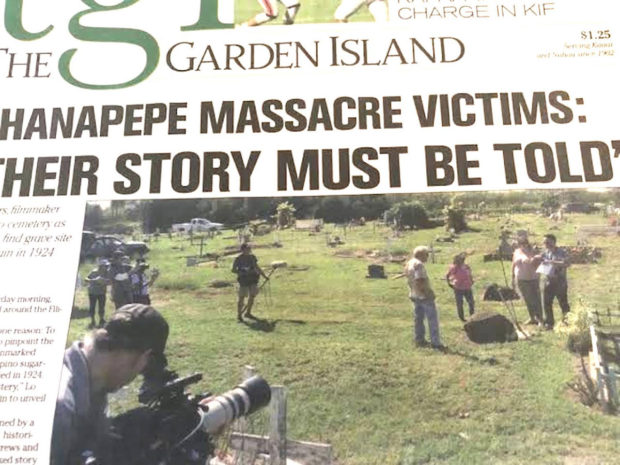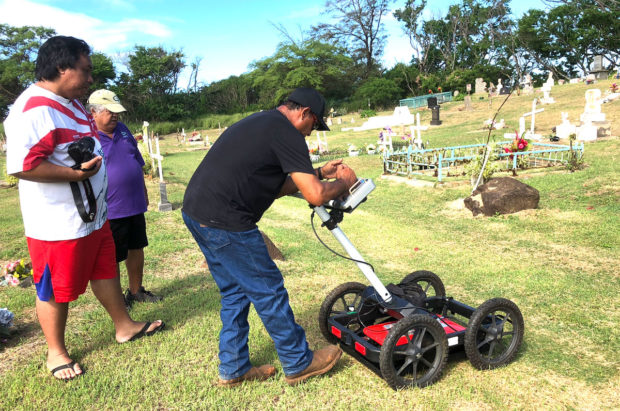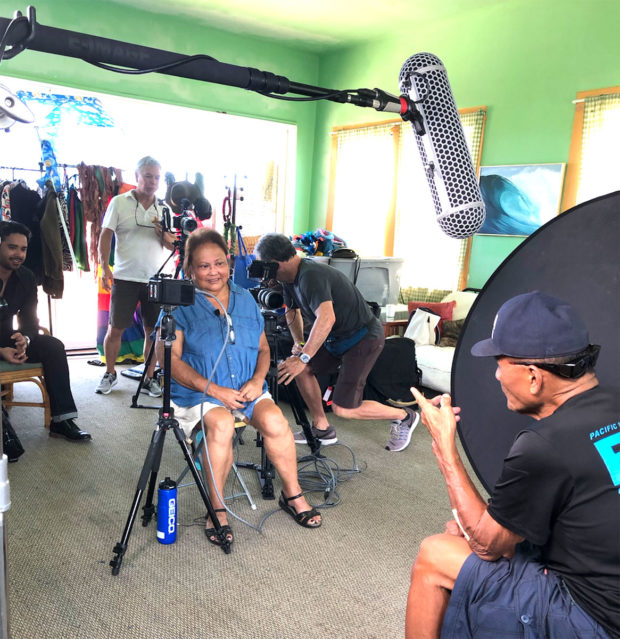Hawaii bill seeks funding for film on 1924 massacre of Filipino strikers

GOFUNDME PHOTO
HONOLULU — A bill is moving through the Hawaii State Legislature seeking funding for “The Hanapepe Massacre Mystery 1924” documentary film project, which has a story “that must be told” according to supporters.
“We see a critical opportunity here to better educate and inform our Hawai’i community about a shrouded and tragic history suppressed for 95 years,” says Emmy Award-winning filmmaker Stephanie J. Castillo, who leads a team of Kaua’i filmmakers of Filipino ancestry.
“The introduction of this bill by Representative Rida Cabanilla Arakawa (D-HI-041) ) and several colleagues in the House (Romy Cachola, Richard Cregan, John Mizuno, Roy Takumi, Tom Brower, Troy Hashimoto, Dale Kobayashi, Chris Lee, Mark Nakashima and Joy San Buenaventura) affirms our effort and strengthens our commitment to set straight the record of this tumultuous event in Hawaii’s early labor history and to correct the racist misperceptions of Filipinos in that day that have colored coverage and understanding of the tragedy. Grave injustices that occurred and the lack of understanding of why this massacre happened is at the heart of the story we will tell, based on historical documents.”

Ground-penetrating radar in October 2019 finds the marked trench at the Hanapepe Filipino cemetery where the 16 slain Filipino workers were buried. CONTRIBUTED
Castillo had originally planned to create the film as a 90-minute documentary for future broadcast on national PBS, but changed her plans when it became clear, after intense media attention upon announcement of her project in September 2019, that “the greatest interest and the highest impact instead would come from staging the screening of a 30-minute docudrama for our Hawai’i community statewide in conjunction with community ‘talk story’ forum events.
She added: “A sharper focus on this tragedy to educate and inform our future generations who know nothing of this history is needed as we approach the 100th anniversary of the massacre in 2024.”
The HB2515 Bill asks the Legislature to fund the project, as well as the publication of a compendium of articles and research documents used by the filmmakers in the making of their 30-minute film titled “The Hanapepe Massacre Mystery 1924.”
Forums with speakers, lecturers and panelists will tackle the questions of “Why Did This Happen and How.” The bill also seeks to fund memorials and displays on Kaua’i to pay homage “to the sugar plantation workers who struggled for dignity and self-determination.”
Castillo, a former Honolulu Star-Bulletin reporter is especially interested in exploring the coverage provided by Hawai’i newspapers of the time in telling the massacre story and in preserving this history for 95 years.

Castillo with film crew conducting interviews in Hanapepe town. CONTRIBUTED
Citing the late Helen Chapin’s 1996 book, Shaping History: The Role Of Newspapers In Hawai’i.” Chapin makes a point “to question the Garden Island newspaper’s coverage and whether it made ‘any attempt to understand Hanapepe after the disaster and failed strike.’”
Chapin called the Garden Island’s coverage “relatively mild in comparison to the rabid Honolulu papers.” Special bulletins from Kaua’i, she said, printed by the papers ran “blatantly false eyewitness accounts.“
The record is still amiss, often contradictory, and needs updating, says Castillo. The victims’ mass grave was just found in October at the Hanapepe Filipino cemetery by community researchers on Kaua’i who had been searching for the unmarked burial site.
The former journalist also cites recent findings by the Legislative Reference Bureau in its 2020 report to Rep. Cabanilla that found injustices against the Filipino strikers and their survivors were very apparent. It said: “The Hanapepe Incident is blamed entirely on the strikers and quotes to substantiate this are taken from interviews with the policemen involved. Court records and documents which may have provided insights from the perspective of the strikers have been routinely destroyed along with other records of the same era.”
And it points out that “the Kauai sheriffs … were not reprimanded for their role in the violence.” It also noted this injustice cited in a 2010 Honolulu Magazine article: the Hawaiian Sugar Planters Association “gave each of the four sheriffs’ families $500 ($6,300 in 2009 dollars), while the families of the 16 strikers had to split about $75 ($947 in 2009 dollars), barely $5 per dead striker.”
Castillo’s project team leaders include co-Executive Producer Randy Francisco of Hanapepe, the former film commissioner of Kaua’i, and Lead Researcher / Producer Christopher Ballesteros of Boston / Kaua’i, who wrote an award-winning history paper on the massacre for his Harvard undergraduate degree thesis.
The film project is the 11th documentary for veteran filmmaker Castillo, whose Filipino family comes from Kapahi, Kaua’i. She is planning to testify in person when HB2515 comes up for a hearing.
Castillo and her team asks everyone to submit testimony electronically in support of HB 2515, or to sign a petition that is circulating. To submit testimony, please register at https://www.capitol.hawaii.gov/ and select SUBMIT TESTIMONY for instructions.
To sign the petition, send an email to us and the link for the petition will be returned to you. Write us at randallfrancisco@gmail.com or christopherballesteros@gmail.com. Or contact Rep. Cabanilla Arakawa’s office at repcabanilla@Capitol.hawaii.gov.

